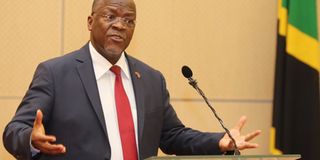My government respects separation of powers: Magufuli

What you need to know:
President John Magufuli yesterday reaffirmed the government’s respect to separation of powers and he will not interfere with other state pillars state-the Parliament and the Judiciary.
He directed the office the Director of Public Prosecutions (DPP) to ensure investigation of cases is speeded up to enable justice is arrived amicably without delay.
The Tanzania opposition parties have been separately blaming President Magufuli for lack of respect to principles of democracy, rule of law and independence of the judiciary, pleading the international community to cut aid to his government
Dar es Salaam. President John Magufuli yesterday reaffirmed the government’s respect of separation of powers, promising that he will not interfere with other state pillars including Parliament and the Judiciary.
He directed the office of the Director of Public Prosecutions (DPP) to ensure investigation of cases was speeded up to enable justice without delay.
The Tanzania opposition parties have been separately blaming President Magufuli for lack of respect to principles of democracy, rule of law and independence of the Judiciary, pleading the international community to cut aid to his government.
But, yesterday, when addressing Judiciary officials and stakeholders during the climax of the Law Day 2019, President Magufuli said his leadership will continue to respect separation of powers without interfering with state pillars.
He said the government he led would continue to value the Judiciary and that he was aware of challenges it faced including interference from government executives.
“You are supposed to provide justice in order to avoid such interference. Sometimes interference is caused by people’s anger. As said by the Speaker, the boundaries of each pillar should be respected,” he said.
“I have tried all my best to avoid interfering with other pillars. I never interfere with Parliament even if I’m abused, rather I switch off the television and walk away.
“I never interfered the judiciary even if I’m sued irrespective of Article 46 of the country’s constitution, I keep quiet and that is freedom,” he added.
He challenged the DPP’s office to speed up case investigation in order for justice to be delivered without delay, saying prolonged investigations unnecessarily delayed provision of justice.
“Someone is caught with exhibits such as elephant tusks and illicit drugs, but the response is that investigation is underway. They even take the government tusks and illicit drugs to Chief Government Chemist (CGC) for laboratory tests until when they turn to ashes,” he said.
According to him, lawyers of the applicant and respondents sometimes collude in favor of the suspect over receive financial benefits and that court registrars sometimes make allocation of cases to judges on similar veins.
He noted that currently the government has 552,000 servants in its payroll and that 52,000 vacant positions have been advertised that will include judiciary officers.
“Human resources is a great challenge facing all sectors including police and education from the basic level to higher learning institutions,” he said.
He called heads of various institutions to adopt alternative measures to address the challenge, including use of magistrate allowed to work as magistrates as provided by Section 173 of the law.
According to him, the government appointed eight Court of Appeal Judges, 27 High Court Judges and promoted 1,211 judiciary workers.
He called for speeded conclusion of matrimonial cases, saying mobile courts could be used for fast tracking the exercise.
Speaking during the event, Chief Justice Prof Ibrahim Juma said the judiciary increased revenue collections from July to December 2018 from Sh1.62 billion to Sh2.2 billion.
He said the judiciary was facing shortage of 18,556 staffs out of 24,643 required, noting that currently it had 6,096 staffs only.
“However, 248 servants left employment between January to December 2018; 200 of them after retirement, 35 because of death and 194 over certificates saga,” he said.
“Someone is caught with exhibits such as elephant tusks and illicit drugs, but the response is that investigation is underway. They even take the government tusks and illicit drugs to Chief Government Chemist (CGC) for laboratory tests until when they turn to ashes,” he said.
According to him, lawyers of the applicant and respondents sometimes collude in favor of the suspect over receive financial benefits and that court registrars sometimes make allocation of cases to judges on similar veins.
He noted that currently the government has 552,000 servants in its payroll and that 52,000 vacant positions have been advertised that will include judiciary officers.
“Human resources is a great challenge facing all sectors including police and education from the basic level to higher learning institutions,” he said.
He called heads of various institutions to adopt alternative measures to address the challenge, including use of magistrate allowed to work as magistrates as provided by Section 173 of the law.
According to him, the government appointed eight Court of Appeal Judges, 27 High Court Judges and promoted 1,211 judiciary workers.
He called for speeded conclusion of matrimonial cases, saying mobile courts could be used for fast tracking the exercise.
Speaking during the event, Chief Justice Prof Ibrahim Juma said the judiciary increased revenue collections from July to December 2018 from Sh1.62 billion to Sh2.2 billion.
He said the judiciary was facing shortage of 18,556 staffs out of 24,643 required, noting that currently it had 6,096 staffs only.
“However, 248 servants left employment between January to December 2018; 200 of them after retirement, 35 because of death and 194 over certificates saga,” he said.




